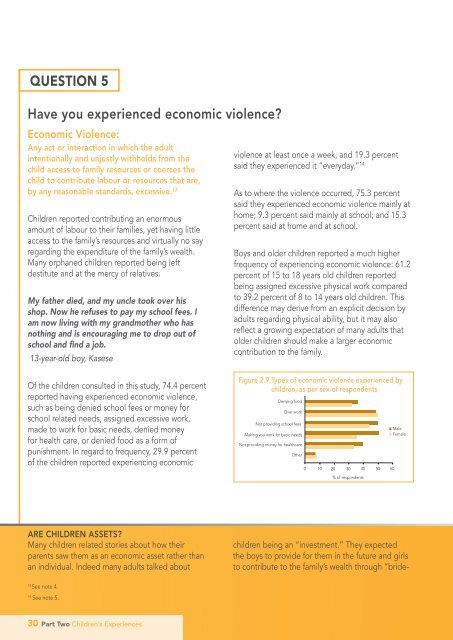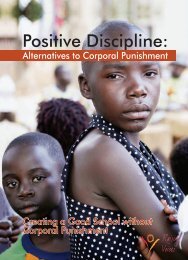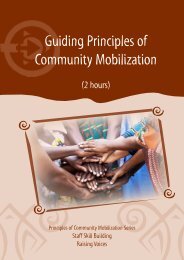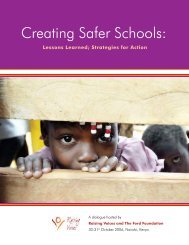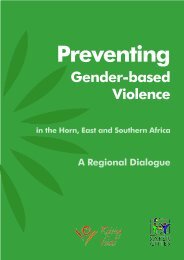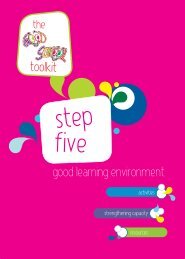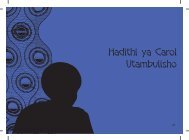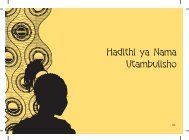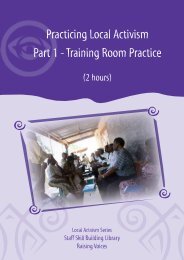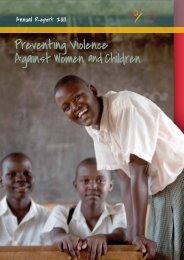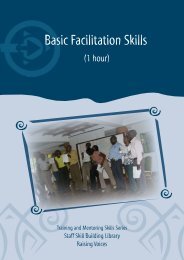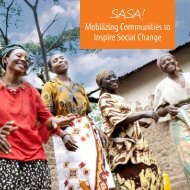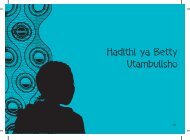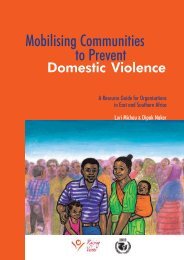Violence against children, the voices of Ugandan ... - Raising Voices
Violence against children, the voices of Ugandan ... - Raising Voices
Violence against children, the voices of Ugandan ... - Raising Voices
Create successful ePaper yourself
Turn your PDF publications into a flip-book with our unique Google optimized e-Paper software.
QUESTION 5Have you experienced economic violence?Economic <strong>Violence</strong>:Any act or interaction in which <strong>the</strong> adultintentionally and unjustly withholds from <strong>the</strong>child access to family resources or coerces <strong>the</strong>child to contribute labour or resources that are,by any reasonable standards, excessive. 13Children reported contributing an enormousamount <strong>of</strong> labour to <strong>the</strong>ir families, yet having littleaccess to <strong>the</strong> family’s resources and virtually no sayregarding <strong>the</strong> expenditure <strong>of</strong> <strong>the</strong> family’s wealth.Many orphaned <strong>children</strong> reported being leftdestitute and at <strong>the</strong> mercy <strong>of</strong> relatives.My fa<strong>the</strong>r died, and my uncle took over hisshop. Now he refuses to pay my school fees. Iam now living with my grandmo<strong>the</strong>r who hasnothing and is encouraging me to drop out <strong>of</strong>school and find a job.13-year-old boy, Kaseseviolence at least once a week, and 19.3 percentsaid <strong>the</strong>y experienced it “everyday.” 14As to where <strong>the</strong> violence occurred, 75.3 percentsaid <strong>the</strong>y experienced economic violence mainly athome; 9.3 percent said mainly at school; and 15.3percent said at home and at school.Boys and older <strong>children</strong> reported a much higherfrequency <strong>of</strong> experiencing economic violence: 61.2percent <strong>of</strong> 15 to 18 years old <strong>children</strong> reportedbeing assigned excessive physical work comparedto 39.2 percent <strong>of</strong> 8 to 14 years old <strong>children</strong>. Thisdifference may derive from an explicit decision byadults regarding physical ability, but it may alsoreflect a growing expectation <strong>of</strong> many adults thatolder <strong>children</strong> should make a larger economiccontribution to <strong>the</strong> family.Of <strong>the</strong> <strong>children</strong> consulted in this study, 74.4 percentreported having experienced economic violence,such as being denied school fees or money forschool related needs, assigned excessive work,made to work for basic needs, denied moneyfor health care, or denied food as a form <strong>of</strong>punishment. In regard to frequency, 29.9 percent<strong>of</strong> <strong>the</strong> <strong>children</strong> reported experiencing economicFigure 2.9 Types <strong>of</strong> economic violence experienced by<strong>children</strong>, as per sex <strong>of</strong> respondentsDenying foodOver workNot providing school feesMaking you work for basic needsNot providing money for healthcareO<strong>the</strong>r0 10 20 30 40 50 60% <strong>of</strong> respondentsMaleFemaleARE CHILDREN ASSETS?Many <strong>children</strong> related stories about how <strong>the</strong>irparents saw <strong>the</strong>m as an economic asset ra<strong>the</strong>r thanan individual. Indeed many adults talked about<strong>children</strong> being an “investment.” They expected<strong>the</strong> boys to provide for <strong>the</strong>m in <strong>the</strong> future and girlsto contribute to <strong>the</strong> family’s wealth through “bride-13See note 4.14See note 5.130Part Two Children’s exprience Experiences <strong>of</strong> violence


